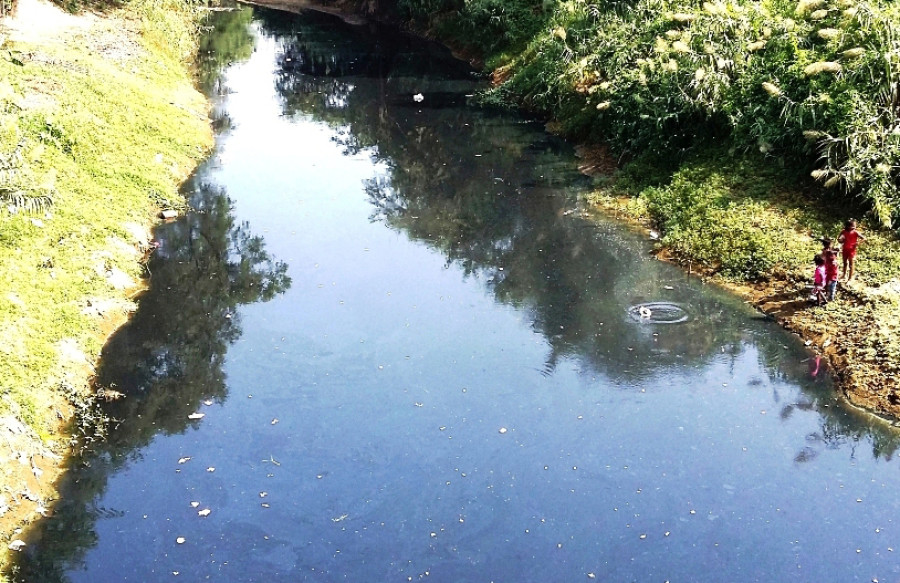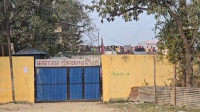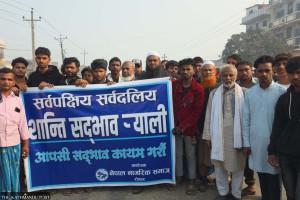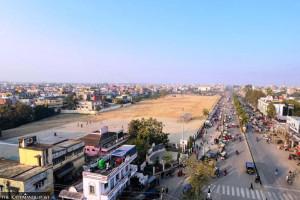Madhesh Province
Owner and manager of a leather factory in Parsa Bara arrested over Sirsiya stream pollution
Industrial waste from the Parsa-Bara Industrial Corridor has become a major contributor to the pollution of Sirsiya stream, say authorities.
Shankar Acharya
The District Police Office in Parsa arrested a Chinese national, Liuta Chuang (36), owner of a leather factory in Parsa Bara Industrial Corridor and his manager, an Indian national, Tinjung Gurung (35), on the charge of polluting the Sirsiya stream in Chorni in Birgunj Metropolitan City.
The duo was arrested from the premises of the leather factory on Wednesday.
“Although we requested the factory management to stop dumping toxic waste into the stream, they did not listen to our request,” said Gautam Thapa, deputy superintendent of police. He said, “Chuang and Gurung were arrested after the locals filed a complaint against the leather factory.”
Industrial waste from the Parsa-Bara Industrial Corridor, which houses over 3,400 factories, has become a major contributor to the pollution of the Sirsiya stream, say local authorities.
The stream, which flows through the central part of the Birgunj Metropolis, was home to aquatic life such as fish, turtles and crabs before the stream turned toxic with industrial waste, say locals.
Surendra Prasad Kurmi, a Birgunj local who is also the coordinator of the Sirsiya Stream Pollution Free Campaign, said, “The locals of Birgunj have been struggling to save the Sirsiya stream for the last two decades. Nobody has taken any action against the industries until now. Hopefully, this will deter other industries from turning Sirsiya into a dumping ground.”
According to Kurmi, last year local campaigners filed cases in the District Court against nine industries operating in the corridor. The campaigners have also filed cases against all 43 industries of the corridor in Birgunj High Court on September 25.
Most of the industries manufacture textiles, pharmaceuticals, steels, leather goods, chemicals, liquors, ghee, and soaps. For the residents of Birgunj Metropolis and around one dozen villages in Parsa and Bara districts, the Sirsiya stream holds religious significance. Every year the locals gather on the banks of the stream to observe Chhath but the pollution in the stream is making it difficult for them to go near the stream, said Ganesh Patel, a local man. According to him, the establishment of the industrial corridor in 1979 and its development over the years proved disastrous for the Sirsiya stream.
“We would depend on the stream for our water needs—to cook, clean, bathe and feed our livestock—but that has become unimaginable with every passing year,” he said. The stream has been poisoned to the extent that it does not support any life form, he added.
The industries and the local administrations in Parsa and Bara districts had come to an understanding wherein the industries had agreed to not dump waste into the Sirsiya stream during the Chhath festival to allow the locals to observe Chhath by the stream. But the move remained ineffective in combatting water pollution with the industries dumping waste into the stream soon after Chhath.
A decade ago, a committee headed by Ritesh Tripathi was formed to mitigate pollution in the stream and it had identified 48 sources as major pollutants; 46 of them were factories and industries inside the corridor. The committee had recommended the concerned factories and industries to install wastewater treatment plants. But the recommendation was largely snubbed. Hardly two to four industries heeded the committee’s advice.




 13.16°C Kathmandu
13.16°C Kathmandu















